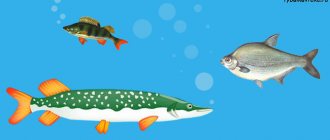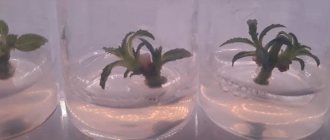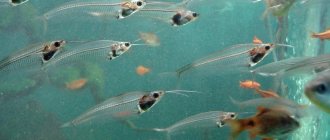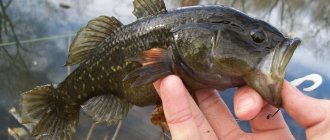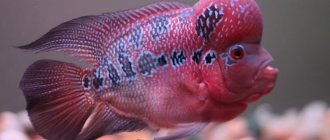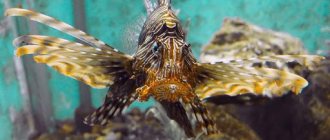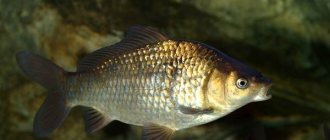Why the myth of short memory stuck specifically to fish is unknown. However, the ability of aquatic inhabitants to remember and memorize concerns not only their owners, but also scientists. Today, the expression “memory like a fish” can be safely refuted. Owners, bright minds, and even fishermen boldly come to the defense of fin owners. What does the fish remember?
Scientists and fish lovers have long been debating the memory of these creatures.
What kind of memory does a fish have?
Goldfish - photo
To establish what kind of memory a fish has , they conducted many experiments on “cichlids,” one of the varieties of aquarium fish. The meaning of the experiment was simple: the fish were fed in a certain place in the aquarium, then they were moved to another aquarium for a short time, gradually increasing the time they spent in it. As a result, the fish’s memory of the feeding place remained for 12 days after their return to their native environment.
And yet, how many seconds retain its memory ? According to scientists who conducted an experiment with fish, this is at least 12 days or 1,036,800 seconds. And certainly, a fish’s memory in seconds cannot be short, and equal to the generally accepted time - 3 seconds.
Memory like a fish.
The memory is like that of a fish, are you sure that it doesn’t remember you?
Where did the opinion about the short memory of fish come from, it seems to me from amateur fishermen. I am a fisherman myself, and often when fishing, after the next prey disappears and the hook breaks, the fish immediately becomes prey. Each fish knows its gear well; the hook and leash have become an identifying mark of a short second of memory. The same thing happens with fish that have just been released and are wounded in a certain place on their body.
In this case, apparently, natural instinct and herd instinct, a sense of competition are at work - after all, everyone knows that even aquarium fish eat without measure and often die from overeating. The same thing happens with river and sea fish, and sea fish are even caught on an empty hook. There is a method of fishing in the open sea called “tyrant fishing.”
By the way, the memory of the fish was not always considered short; remember the fairy tale about “The Fisherman and the Goldfish”; after all, the goldfish did not forget its old man and the quirks of his old woman. Therefore, it was not always believed that goldfish have a short memory.
Those who keep aquarium fish, especially gold ones, say that they behave like puppies; when they see their owner, they simply crawl in front of him, wag their tail, expressing joy with their entire appearance.
Abandoned aquarium, the same one in the top photo
And the simplest aquarium fish, guips, also have a remarkable memory. This is purely my observation. It is no secret that often children, having become carried away by one activity, give it up. That’s how I ended up with an aquarium with fish, and not one, but two - a 30-liter and a 200-liter one.
The simplest aquarium fish - veil-tailed gupi - photo
We gave away the goldfish from the large aquarium, but in the small aquarium, only veiled guips remained. No one looked after them, they fed them once a day in the morning, and added water that evaporated. Without any aeration devices, thanks to plants, they lived and multiplied for several years.
Public opinion
Despite many studies, public opinion about goldfish memory has not changed much. The main reason for this is that “fish have a serious PR problem,” says Brown.
Most people don't encounter live fish in their daily lives, and even if they do, "people don't interact with fish the way they interact with other animals," Brown says. This makes it easier for misconceptions and myths to spread widely, he said. However, public perception of fish cognition may be improving as more charities and non-governmental organizations spread information about fish intelligence. “The situation is changing faster now than before,” Brown added. "But it's still slow."
Pet owner guilt may be another factor in underestimating goldfish memory. “I suspect it has more to do with the fact that we feel good when we put them in a small bowl,” Brown says. "That probably says more about us than it does about the goldfish."
With proper care, goldfish can live 20 years, so owners should consider getting larger aquariums with enrichment elements and fish friends, and spend time playing with them and teaching them tricks, says Brown. After all, your goldfish may remember certain experiences for years to come.
What is the memory of a fish?
The misconception about a three-second memory is already refuted by ordinary aquarium pet lovers. Each of them determines the memory time of fish differently. Some people allocate a period of short memory of 2 minutes, others give other figures, but everyone agrees that you can develop the habit of swimming to the place of food in response to a knock or other conditioned signal. Many fish can distinguish the owner of the aquarium from a stranger.
When studying the life of carp, it was found that they can form stable groups, breaking up and gathering again.
Moreover, each group has its own “veteran” who can somehow pass on his experience to younger friends.
What exactly makes sense to remember?
The memory of fish is significantly different from that of humans. It has selective properties, only what is of vital importance is remembered. River fish remember feeding places, resting places, school members, and natural enemies. There are two types of fish memory - long-term and short-term.
Aquarium fish also remember the information they need. Unlike their free brothers, they are also able to remember the identity of the owner and feeding time. Many experienced fish lovers notice that if they feed their pets by the hour, then during the approximate feeding period all the little ones gather in one area waiting for food.
They are also able to remember all the inhabitants of the aquarium. This allows them to detect newcomers who are added to the aquarium. Some fish study new residents with interest, while others shy away from strangers.
To reliably answer the question “do fish have memory?”, various experiments were conducted.
They also live quite a long time
There's something else you may not know about goldfish, and that's their lifespan. If you buy such a pet, you will probably watch it, clean its aquarium and feed it for many years. With proper care, a goldfish living in your aquarium can live 10 years, and some lucky specimens have reached several decades of age!
Brother and sister Matthew and Hayley Wright won two goldfish at a fair in Brockworth, Gloucester, England, in 1977, naming them Splish and Splash. When the children grew up and left their parents' home, their father, Richard Wright, began to look after the fish. In 2015, one of these fish, Splash, became the oldest living goldfish, reaching the age of 38 years!
However, Splash's age is not a record. The top spot here is held by the fish Tish, who died in her round aquarium in 1999 at the age of 43. Her owner, Hilda Hand, was sure that Tish recognized her. According to Hilda, she used to talk to her goldfish.
The story of the Tish fish is similar to the story of Splish and Splash. Hilda's son, Peter, won Tish (along with another fish, Tosh) in 1956 at the fair held in Doncaster (South Yorkshire, England). When Peter decided to get married and left his parents' home, Hilda and her husband took on the responsibility of caring for these pets. Tosh died in 1975.
You might think that having lived to such an old age, Tish had grown quite large, but she was only 12 cm long. The opinion that goldfish grow to the size of their aquarium is not true - their size is determined primarily by genetics.
In general, aquarium goldfish can grow up to 25 cm in length, and pond goldfish (that is, those living in a pond) - up to 46 cm.
(Based on source: https://www.ripleys.com/weird-news/goldfish-memory/)
_____________________________________________
See also other publications:
_____________________________________________
Thank you for your attention to my channel! Subscribe to it if this material has piqued your interest. I will also be grateful if you like and/or share this article on social networks.
Australian experience
Particularly noteworthy is the experiment conducted by one Australian student. He placed the beacon in the place where he threw food to his pets. Moreover, he placed it in different places so that the fish could remember exactly the mark and did this 13 seconds before distributing the food. This went on for three weeks. The first days it took the fish at least a minute to gather at the distribution point. By the end of the experiment, they completed this task in about five seconds.
The researcher then took a break of six days and distributed food without a beacon. After resuming the experiment, he was surprised to find that after lowering the beacon, the fish needed only 4 seconds to swim to the place.
This showed that fish have fully developed both long-term and short-term memory. That is, they remembered the event that happened a week ago, and they had enough patience to wait fifteen seconds before the food was distributed after the beacon was lowered.
Experiment with cichlids
Scientists from Canada conducted a slightly different experiment to determine the memory of fish. They tried to figure out whether cichlids are able to remember a specific feeding location that is not associated with an identification mark.
Over the course of three days, they poured food into the aquarium in one specific place. By the end of the experiment, most of the fish swam there. Then all the cichlids were transplanted into another aquarium, which was completely different both in structure and volume from the first. They spent 12 days there. Then they were returned to their native aquarium. Scientists discovered that all the fish swam in the exact area where they were given food twelve days ago.
Many other experiments have been carried out. Of particular interest is the experience of Japanese researchers, where they studied fish with transparent bodies, and scientists could visually study the functioning of the brain of living creatures using the introduced labels.
In any case, numerous experiments and practical observations have shown that the memory of fish is not fiction, and it significantly exceeds three seconds. Not every person is able to store information for as long as these creatures. So it is unknown who was more offended by the above-mentioned TV presenter - Michael Phelps or the fish.
Aquarium fish memory - 10 seconds
2 laps around the aquarium and a new life.
There is a saying - “memory like a fish”, and it is believed that their memory has a duration of 3 seconds. This conclusion was made by amateurs from observations of the life of an aquarium. But the proverb does not justify itself. There are many experiments conducted by scientists proving that fish have a longer memory than is commonly thought.
For reference, you can read about two experiments that were carried out by two different people, independently of each other. They confirm the presence of long-term memory in fish.
Its author is student from Australia Rorau Stokes (15 years old). The guy immediately questioned the hypothesis about short-term memory in fish, and the purpose of the experiment was to establish the period for which the fish would remember something important for itself. The young man caught several goldfish and placed them in a separate container. Before feeding the individuals, 13 seconds before, he released a special beacon into the liquid, signaling the location of the food.
Memory as a survival tool
First, let's talk about fish living in natural conditions. Their existence is determined by many random factors, so it will not be possible to fully rely on the instincts inherent in nature (by the way, which also arose as a result of memorizing and analyzing information).
- the most food-rich areas of the reservoir;
- potentially dangerous places;
- attractive spawning areas;
- external appearance of natural enemies (and humans);
- natural environment (especially important for schooling fish) and other vital aspects.
As a result, we can conclude: a well-developed memory is a prerequisite for survival for representatives of all types of marine and freshwater ichthyofauna.
Some species (for example, butterfly fish) choose a mate for life and store the appearance of the partner in memory. In short, there are many examples!
Observations from fishermen and aquarists
Anglers can be divided into two camps. Representatives of the first believe that the situation with memory and “thinking” among representatives of the ichthyofauna is very deplorable. It was from them, apparently, that the legend about the three-second capture of information by fish came from.
As an example, it is customary to cite the same crucian carp, which, having safely gotten off one hook, is able to get caught on the next one in a matter of seconds. So, he did not forget about the trouble that happened to him, but simply considered that the tasty bait was worth a torn lip, and decided to repeat the experiment. And here is another example of competitors crowded around, claiming to have exquisite food! In a word, the memory of fish often succumbs to the pressure of instincts, especially during the period of gluttony.
Other fishermen, on the contrary, rely on the ability of representatives of the ichthyofauna to remember the information they need. At the beginning of the session, they carry out massive feeding of a certain water area, then continue to feed the fish in smaller portions. The fish remembers the location of the makeshift dining room and continues to return to the same place even after stopping feeding.
Examples of memory demonstrations by freshwater fish
If checking the memory of a dog or cat does not present any special problems, then with representatives of the ichthyofauna, especially those living in natural conditions, the situation is much more complicated. However, it is quite possible to identify some trends.
Many predators have their own hunting grounds, to which they return after long wintering and spawning. By the way, some species of freshwater fish (for example, carp) tend to spawn in a place chosen from the first spawning, changing their habits reluctantly, only under the pressure of circumstances (for example, with a serious change in water level).
Experiments by ichthyologists
The observations of practicing fishermen are good, but they are clearly not enough to confirm the thesis about the presence of long-term memory in fish. Therefore, we present evidence of this fact obtained by ichthyologists in different parts of the world in the course of independent research:
Summary
During the research, it was found that fish have quite decent memory: they are able to remember events and images that are important to them for a fairly long period of time. And the more important this information is for a comfortable and safe existence, the faster it is absorbed by the brain and stored for a longer period.
So you shouldn’t consider fish dumber than they really are. Let us repeat: you cannot call them intellectuals of the animal world, but representatives of the ichthyofauna are able to remember what they need for months and even years!
River fish move along the same routes in search of food, and this behavior lasts from several years to a lifetime.
